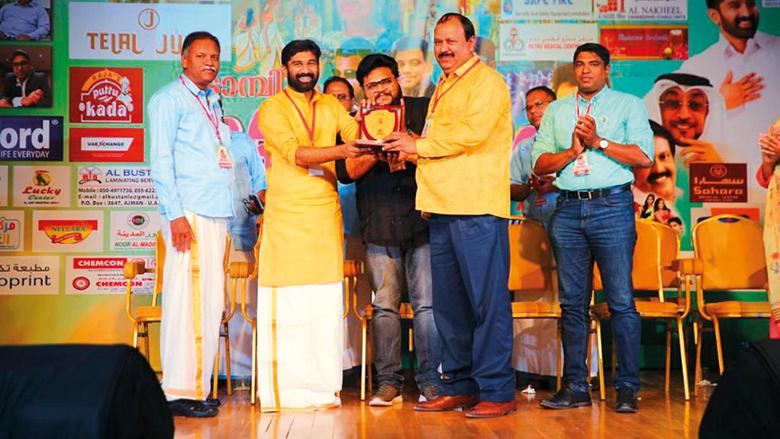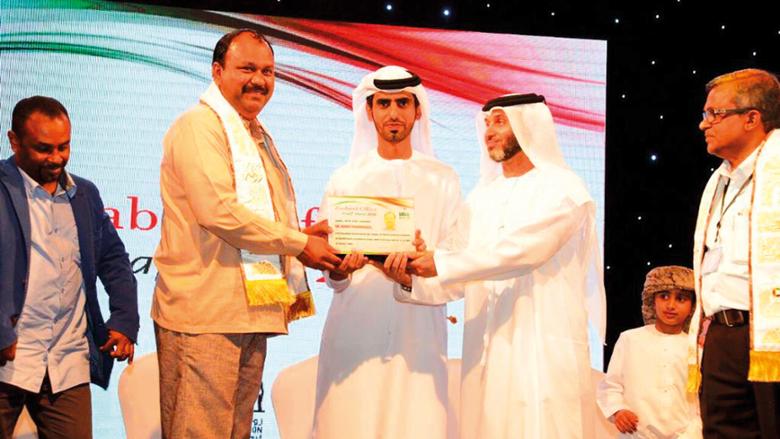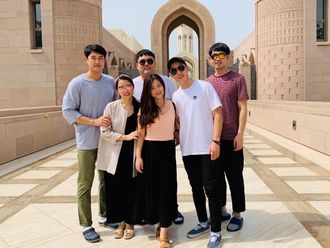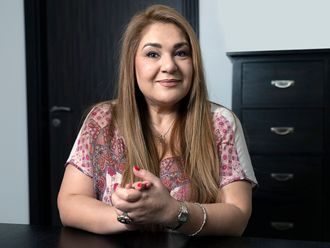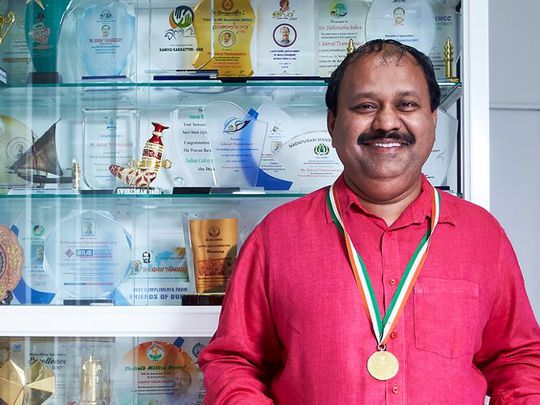
The memories of one of the greatest moments in Ashraf Thamarassery’s life will always be eclipsed by the shadow of death. The 44-year-old Indian social worker’s recollection of the telephone call informing him he won the prestigious Pravasi Bharatiya Award in 2015 is gratitude tempered by the inability to truly rejoice.
‘When TP Seetharam sir (former Indian ambassador to the UAE) called me with the news, I had just returned from the funeral of a 12-year-old girl who had fallen to her death from a building in Sharjah,’ Ashraf says.
Seetharam’s was perhaps one of the few phone calls in the last 18 years that haven’t been an intimation of death for Ashraf — a garage owner by profession and a humanitarian by choice — who has dedicated his life to repatriating the mortal remains of expatriates who die in the UAE.
Dreadful phone calls at all hours of the day and night have become part of life for the Ajman resident.
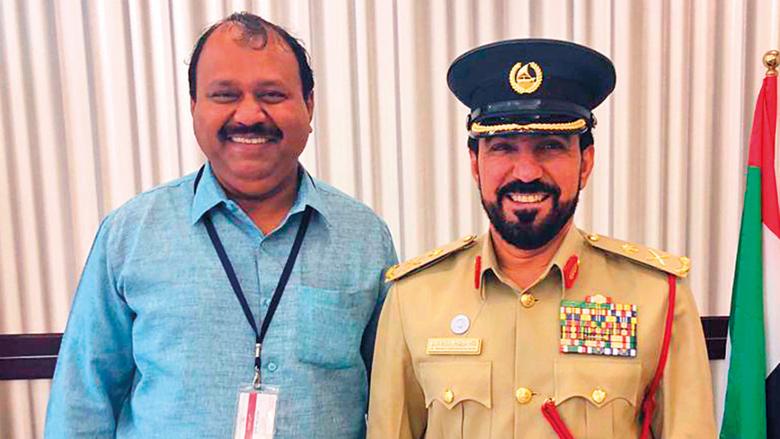
A mere 50 seconds into our conversation and Ashraf has already fielded two calls, directing strangers to health centres and talking them through the steps involved in securing a death certificate for a friend or relative. ‘Like time and tide, death doesn’t wait,’ he says, apologising for the interruption before resuming our conversation about the service he provides voluntarily and free of cost.
‘Earlier, a lot of people used to hesitate to contact me, worried I might charge them. But now everyone knows I do this for free.’
Ashraf is referring to the spotlight Bollywood actor Sridevi’s death in Dubai last year shone on his work, resulting in a slew of articles and media reports — both international and regional — documenting his humanitarian endeavours.
While some mediapersons egged him on for intrusive details about how, if at all, death had marred the actress’s legendary beauty (‘Yes, I did see her dead body and it was like any another person’s. She looked peaceful’), most reporters highlighted the important work he does. Thanks to the media spotlight, Ashraf quickly became the go-to person for expats in the UAE who had lost a family member or friend and were looking for help to repatriate the body to their home country. It’s the only reason why he acquiesces to interviews and entertains media attention.
His indifference to fame is reiterated multiple times during our 40-minute chat, in a fastfood outlet in Dubai’s Al Muhaisnah one Sunday morning. It’s reflected in his unassuming shrugs that are responses to my queries about the numerous awards he’s garnered over the years (two of his shelves at home are stacked with trophies, medals and plaques ranging from honours granted by charity associations and organisations to an honorary doctorate by Kings University in the US and prizes by the Dubai Police).
He wasn’t aware that the Kerala state government had nominated him for the fourth highest civilian award in India, the Padma Shri, until he read about it in the newspapers. It’s also echoed in his unbiased empathy that doesn’t discriminate between celebrities and the blue-collared workers he’s helped.
‘Death is the greatest equaliser,’ he says. ‘When we die — Sridevi, you, I — we’re all just bodies in a coffin. On the day I helped repatriate Sridevi’s body, I also arranged to send the bodies of three other individuals from here.’
Ashraf has often been described as the ‘guardian of the dead’ and like every hero’s origin story Ashraf’s too is steered by chances and choices. It was sheer chance that led Ashraf to help with repatriation. ‘It was back in 2000. I was at Kuwaiti hospital visiting a friend who was ill, when on my way out I saw two men, brothers, around 30 years of age, sobbing inconsolably. I stopped and asked them what happened and they told me their father had died and they were trying to figure out how to take his body back home to Kollam in Kerala.’
Ashraf didn’t know the first thing about the repatriation process at the time but decided to help the brothers. ‘Seeing those young siblings cry reminded me we’re all people. I wanted to help them.’
Four days later and after clearing all the required formalities, they were able to repatriate the body.
Barely a few days later, another person who had heard of Ashraf’s random act of kindness reached out to him enquiring if he could repeat the deed for the body of a Bangladeshi worker. In that moment, Ashraf chose to willingly continue what had started out as a one-off act of empathy.
‘Since then, I’ve helped repatriate over 5,000 bodies to 38 countries, including to Pakistan, Sri Lanka, the UK, US, Uganda and Somalia,’ Ashraf says.
Language has never been a barrier for Ashraf, who always finds a friend, family member or Good Samaritan to act as translator and navigate the linguistic chasm between him and the bereaved.
His is a face instantly recognised at embassies and consulates across the UAE and the goodwill he has shored up across the board — from government departments, to airport authorities and the courts — ensures paperwork is expedited. Officials are happy to go out of their way to accommodate Ashraf’s selflessness. The Indian embassy has his contact details posted on their official website as the go-to person for those who have lost a loved one.
‘The UAE has no law that holds back a dead body, unless it’s an accidental death and they are investigating the cause like in Sridevi’s case. The authorities always treat deaths with respect and aim to get the body to the airport as soon as possible,’ he says.
‘A main reason why repatriating a body is such a prolonged process is because people aren’t aware of what the exact procedure is. That’s what causes delays.’
When Indian expat Shineeb Chembayil’s roommate Rajeev Veliyath, a 47-year-old helper in a maintenance company, passed away due to a heart attack, Shineeb and his grief-stricken roommates were overwhelmed by the task of repatriating the body. ‘We were devastated and shattered by Rajeev’s untimely death. He had no history of heart problems.’
[Research reveals slimmer hips increase the risk of diabetes and heart attack]
Rajeev died on Friday night, October 19. His body was shipped from Sharjah to his wife and parents on Thursday evening solely due to Ashraf’s diligence.
‘It was a complicated process and if Ashraf wasn’t there to guide us through it, it’s easy to get lost,’ Shineeb narrates over the phone.
Typically, the repatriation process involves doing the rounds of around 10 different departments, Ashraf tells me. It involves issuance of death certificates from health centres, documentation from the courts and relevant embassies, police reports, permissions to claim the body from the mortuary and have it embalmed and clearance for airports to fly the body. Today, Ashraf knows the process like the back of his hand, reciting it from memory. But for grieving families who are paralysed by shock and sorrow, paperwork and trips to administrative branches may feel like a twist of the knife in their wounds.
It is on this count that Ashraf is a saviour for most; while he deals with the paperwork, families are allowed to grieve and heal in peace.
‘Ashraf would keep us regularly informed on the status of the paperwork,’ Shineeb reminisces. ‘He came in and saved the day like an angel and before we even had the chance to thank him properly, he was gone.’
Ashraf’s lightning-fast interactions are a conscious decision that doubles up as a defence mechanism against the emotional trauma of death. ‘Of course, I feel sorrow. But if I too look distraught, it only deepens the pain of the friends and relatives who lost someone. So, I interact with a smile and don’t give much thought to my own sadness,’ he says with his characteristic benign smile.
He recalls a case that ripped his soul and left him an emotional wreck for days after: ‘A family from Oman who were holidaying in the UAE met with an accident. The four-year-old daughter was in the ICU, the mother had died and the father was in police custody as he had been driving at the time of the incident.
‘The husband only realised his wife had died when they brought him to the mortuary to identify her body. I was there at the time and I couldn’t hold back my tears.’ Ashraf did not waste time, quickly working on repatriating the woman’s body.
‘I don’t hang around the families more than I need to and I never discuss cases at home. It’s not that I don’t care. I care too much,’ he says.
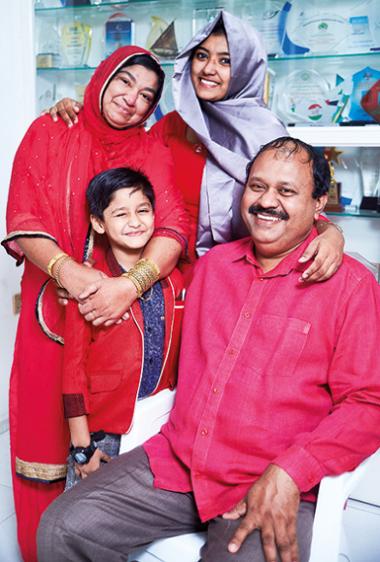
During our conversation, Ashraf avoids pondering over philosophical questions about the nature of death and meaning of life. The father of three doesn’t have the luxury to be numbed by existential inertia that often plagues people who deal with death at close quarters.
His 17-hour-work days begin at 5am and rarely end before 1am. On occasions, when the deceased has few friends or family who can make the trip at sudden notice, which is often the case with many blue collar workers, Ashraf personally accompanies the body to its final destination. ‘Their families sometimes are so poor, they don’t even have enough money to bury them respectably. I once saw a body being buried in a shallow pit right next to the family’s small hut in Kolkata in India. That family didn’t own any additional land where they could bury the dead and could barely afford to take the body to a public crematorium.’
Ashraf has accompanied dead bodies to distant states such as Odisha and Bihar and once found himself stranded in Odisha for four days without a working SIM card or any means to contact the deceased’s relatives. ‘I went to the local police station and told them I’d have to leave the body there because I had to return to the UAE. Fours hours later I got a call from the police saying the body had been claimed by the man’s relatives. They were waiting for me to leave because they had no money and feared I’d charge them. That’s how destitute they were.’
For blue-collared workers, the bleak realities of expat life include the indignity of not being identified. Ashraf narrates an incident where the body of a worker from Andhra Pradesh remained in the mortuary for two months because none of his friends knew about or could help locate the deceased’s family or his hometown.
Eventually, Ashraf used his contacts in the UAE and a local representative in India and tracked the man’s family to a small town in Kadapa in Andhra Pradesh. He quickly made some phone calls to the family. ‘We found that his family were so poor they couldn’t even afford to pay for an ambulance to ferry the body from Hyderabad airport to Kadapa. The widow then sent us a letter giving her consent for her husband’s body to be buried here.
‘I was truly overcome with sadness for the family and a few of us got together and raised Dh10,000, which we sent them.’
This is not the only philanthropic gesture that Ashraf has done. Although he himself doesn’t come from a moneyed background, he spends around Dh200 from his own pocket daily for miscellaneous expenses related to the repatriation. Often, he has borne the entire cost of repatriation if the deceased’s family is unable to afford it.
Unlike Charon, the ferryman of the dead in Greek mythology, Ashraf doesn’t seek payment to convey the dead back home. His generosity has stumped everyone, from Indian Prime Minister Narendra Modi to his own family.
Ashraf’s wife Suhara is now his greatest champion, his ‘pillar of strength who manages the household and our three kids so I can single-mindedly focus on my social work’.
But before she was proud of him, she was baffled and exasperated that his kindness came at the expense of his business and his family time, especially considering that Ashraf left his hometown of Thamarassery in Kerala’s Kozhikode district in 1998 in the definitive expat quest for greener pastures. As the youngest son of nine siblings, he had bettered his family’s fortunes, then handed over the day-to-day running of his garage (his sole source of income) to his brother-in-law and older brother so he could become a dedicated, full-time social worker.
‘The kids and I would always wonder why he had to help others. Then one day almost a decade ago, we were at a dinner table with the Indian ambassador and his family, dining as equals. That’s when the extent of what my husband does and how much it affects people hit me,’ Suhara says. She believes Ashraf’s good health despite his manic schedule and the well-being of their family, ‘are because of all the blessings of the families my husband has helped.’
Once Ashraf is home, he leaves the traumatic incidents of the day behind him and focuses on the family. ‘I don’t understand how he compartmentalises and stays positive. The few times I’ve visited families with him, I’ve taken days to recover from the trauma,’ she says.
The family doesn’t bat an eyelid when they find Ashraf’s bed empty at night because he’s left to help someone. ‘He hardly sleeps for four hours and even if we try to tiptoe around him and let him have a lie-in, he wakes up the minute the phone rings,’ Suhara adds.
The phone has rung four times during our conversation. Each time, he answers the calls, always reassuring and informative without being brusque.
The only time his equanimity slips is when we discuss Indian Airlines’ erstwhile policy of weighing dead bodies and charging their shipment by the kilo (Dh18 per kilo) — a practice against which Ashraf filed a writ petition in the Indian Supreme Court in September 2018 with lawyer Deepak Prakash.
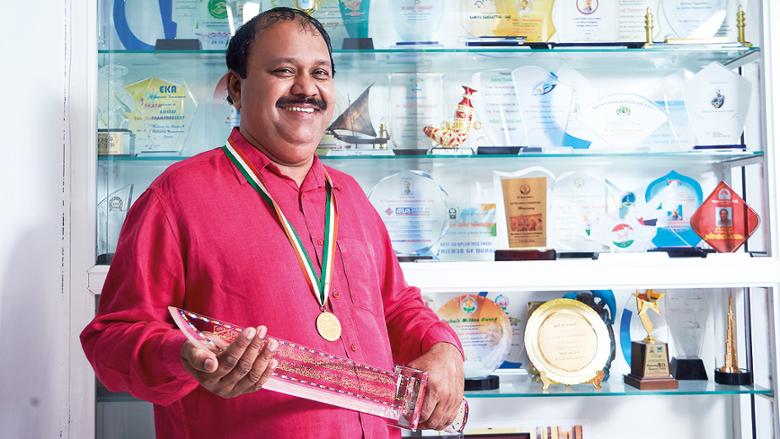
Ashraf vehemently lobbied for years for a complete waiver on repatriation fees by airlines and his efforts partially bore fruit in January this year with India’s national carrier, Air India, implementing a fixed charge of Dh1,500 for transporting human remains, irrespective of age or weight.
He nods his head, shaking off the disappointment that he could not get a complete waiver on fees, and sips his coffee.
I ask Ashraf about the four books that have been written based on his life — all in Malayalam — and the upcoming Malayalam biopic that will see South Indian thespian Mammootty play Ashraf. A glimmer of excitement plays on his face about the film project that’s still in the pipeline. ‘It’s good if more people can know what I do through the film and then they can join me and volunteer too, right?’ he says.
This rhetorical statement also serves as Ashraf’s policy for attending functions and awards ceremonies that honour him: ‘These awards matter to me because it gives me the recognition needed to cut through red tape, get direct access to officials and help people.’
He inadvertently helps the living too, and this is perhaps his greatest contribution — documentary filmmaker Reshel Shah Kapoor, who made a six-minute film on Ashraf called The Undertaker, talks about his infectious positivity and how it makes one want to be a better version of themselves. ‘It takes a lot to help the dead and he’s the only one I know who does it with a smile. He makes the world a better place.’
Ashraf isn’t sure how long he can single-handedly continue to help repatriate bodies, which is why on weekends he used to get his 20-year-old son Shafi — who is now pursuing engineering in Kerala — to accompany him on social work rounds, preparing him to take on the gauntlet at some point.
Even as we prepare to wind up the interview, Ashraf talks about the importance of closure. ‘For families whose loved ones have died in a foreign country, seeing the remains speeds up the healing process. Witnessing the funeral is an opportunity to say goodbye and close that chapter. It is the right of every human being to turn to dust in the soil they were born in. As fellow humans we should do everything to make that possible.’
The phone rings once more and as if on cue, the guardian of the dead is on his way to the embalming centre in Sonapur — to help clear documents for four bodies.



